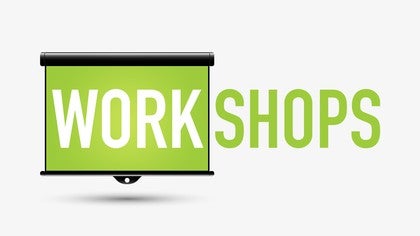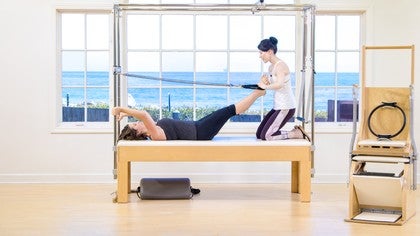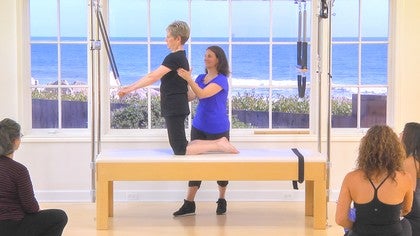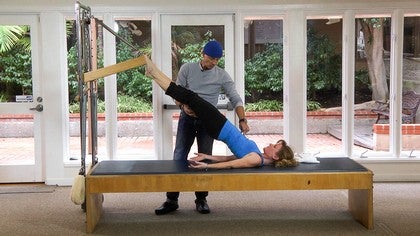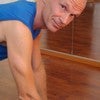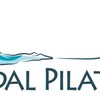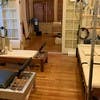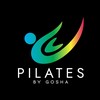Premium workshop
You can view a 2 minute preview. For details, scroll down below the video.
Description
Objecvtives
- Learn how to structure a session for a beginning student
- Learn how to maintain a flow during a beginning session
- See how and why each piece of apparatus is used for this student's particular needs
About This Video
Transcript
Read Full Transcript
Chapter 1
Introduction
So the beginner system is the foundation of the classical Polonius method. Uh, it's the basis from which everything is built upon. But notice I did not call this workshop the basics. Uh, Ramana made sure that we call it a system and that we understood how every piece of apparatus in the Palladio's method is integrated and that we use them and incorporate them toward the common goal with our students. In fact, as an apprentice, Ramana would have you go through seminars that were at the beginner system, the intermediate system, and then the advanced system, not just to learn more advanced exercises, but to learn how to teach them. And there's actually a procedure that we do in the classical Polonius method, uh, that Ramana was very clearly, you know, that she really clearly conveyed to us in how you actually structure a session for a student. So in this workshop, the beginner system, I actually will have a beginner student and I'm going to take her through the basics on the reformer and on the mat. And then I'm going to share with you some of the things that I noticed in her body and how we can use the [inaudible] method to help correct her and possibly realign her and bring her body back into a better balance. And you'll see how I do that through using the various pieces of apparatus.
Chapter 2
Reformer and Mat
Hi, I'm me, Joe with [inaudible] anytime. Um, today I wanted to talk about something that we refer to in the classical Polonius method quite a bit. And it's about teaching a system. Um, Ramana was always quite adamant and talked about how to teach Palladia use. It's always part of a system. We would teach the apprentices, the beginner system and intermediate system. And I want to start with first of all, what, what even, what is the system? So by definition, a system is a set of interdependent yet interactive parts that together create an integrated whole. So with that definition, if you think about how this would apply to the [inaudible] method, Joe created a series of apparatus number. Think he developed about 18 different pieces of equipment.
So we would refer to our system in that we use all of the apparatus to help bring one's body back into a better balanced state. So we have different exercises. As you know, your teach on each piece of equipment. We have beginner exercises we do on the reformer. We'll have some beginner exercises you do on the mat, beginner exercises on the one to chair. All of that would encompass and be considered the beginner system.
Same thing with the intermediate system. There's more exercises. As one gets more proficient in the method, they may be more challenged in other areas, so we constantly progress through the system. We then take all of those intermediate exercises, which Romano would really refer to that as the heart and soul of the piteous method because you can literally stretch strength and realign, rehabilitate anybody through this body of work. Then we would go further for somebody who has been really studying the method for quite a while to the advanced system, which encompasses a lot more challenging exercises. So Joe's system is really the use of all of his apparatus in order to achieve the results.
Another definition of a system is it's also considered a set of principles or procedures according to something to be done. So in that sense, we teach a system in classical Palladio's. Ramana had a very specific way of teaching [inaudible]. So in the classical method, we would often start one on the reformer and then take them to the mat and then go to the third part of the session, which would be, okay, what does this body need? So why did we do that? Well, on the reformer, when you're working with somebody on the reformer, there is an order of exercises that we try to stick with on the reformer.
Same thing on the mat. And as one goes through these exercises, whether they're beginner, where they're intermediate, whatever, they start to develop a flow, they start to eventually understand each exercise and we have smooth transitions and their body starts to move and hopefully even starts to sweat. And then we take them over to the mat and we do the same thing. We're going to continue this body moving and warming up. And as they're moving me, the teacher can really start spotting their imbalances, their weaknesses, their strengths, the areas of their body that needs realigning.
So we usually start in this way because there's a flow. This is exercise Ramana was really adamant about, I don't care how bad somebody scoliosis might be, you would never base the whole session just trying to work that left hip. We're not physical therapists. [inaudible] was not meant to be done. It's not physical therapy. Puligny is a form of exercise. So in keeping the mat flow in the and the reformer flow, this person is now moving and working out.
Then we would come to the third part where we would consider, okay, now what does this body need? And that's when we would introduce the other pieces of apparatus, the ladder barrel, the spine corrector for the spine or the one to chair to help strengthen a powerhouse or whatever the case might be. So that's traditionally how classical Polonius is taught and it's continued to taught that way to the apprentices. When they're studying through their teacher training program, they would first learn the beginner system and then eventually they would move on and learn the whole intermediate system, which would also encompass the beginner system. So today we're going to talk and actually show you how to take somebody through that beginner system. So I have a volunteer, my friend Julie, who works here with philosophies, anytime she is going to go through a beginner system with us.
So you can see what I'm talking about, how we get this person
So traditionally we're going to start heels together, toes slightly apart, and I'm going to help you hold your feet up and just stay here. So when I teach my beginners, I try not to get too picky and detailed because what happens is this person will automatically stop moving because now they're becoming very self conscious of how they're moving. So for my beginners, you really want to get this flow going. This is a workout, right? It's not going to be perfect. It's not going to be perfect. Certainly after those, this is going to be your six lesson. I can't expect that of her. But as we continue each time, it's going to get a little better. With that said, what are the first things that I would correct for my beginners?
Number one first when she gets on this rumor, I want to make sure she's square. So before I get her moving, I want to get her square number two. Hopefully by the end of the session I can get my beginner into their powerhouse and get them feeling of that. Everything initiates from our powerhouse and ultimately hopefully I can get her moving and get her sweating cause this is a workout. So I'm going to start by straightening you out.
So I'm going to stand back here and I notice your neck is off to the sides. I'm going to take your head very slightly and bring it here. Now without even having to move, I can see your hips are off to the side. So what I'm gonna do is I'm gonna use my hands and help you lift and pull you so you're more square. So lift your hips with me up, up, up, up. Let's say there. Now can you roll down one vertebrae at a time? Isn't that nice?
Okay, so what I just did is I helped her with her pelvis. I lifted her and as she rolled down I pulled my left hand a lot more than the right to help her lengthen out that whole right side of you. Do you feel that? That feel good? You're square right now. Okay. All right. Here we're going to take those heels up. Drawing your stomach. Yeah, so your stomach is in and up and notice your back will be flattened. This position, the heels are up, the knees are only shoulder width.
This draws in and let's go pull everything up to go out and in. Good. Now I want you to really stretch those legs for me. Julie. Grow Taller each time. That's it. And that draws deep inside you. How's that feel? Good. Let's get taller. Keep going. Really reach and and really reach.
Beautiful. Go all the way, Julie. And then some nice stretch and in up stretch. Good. Give me one more. Make it your best. How far can you go? And then bring it in now on your arches together. Okay, let's go out candy or reach God.
Now on that last Ninja there, can you also use your seat and squeeze and then come back in up into here. [inaudible] and all the way stretch and in. So as you [inaudible]
Use that seat and then go one more all the way. Reach it. Come in and hold. Okay, so one thing I noticed that she is hyper hyperextending her knees a little when she goes all the way out. Flex your feet. So when you go out there, I'm going to put my hands over her. So now she can't type or extend. But I'd like to see you engage your glutes more. So go out and you'd find them. Can you feel them? Yeah. Yes. By using them will help prevent you from doing this.
Hyperextension yeah. Good. Nice. Julie. Rich, use your seat and then, and go use your seat and then, and go use your z. And notice what I'm doing with this hand.
Your longest positions stay beautiful and your seat stays tight for me. As you lower your heels down and ah, control down. Ah,
It's a big muscle that we use to help stabilize your whole body.
This right heel can push a lot further under the bar than the other. But I'll tell you what, I'm not going to correct it. Now I want to keep moving, but I'm going to make a note of that. We need to correct that in part C, it's usually not coming from the foot. You weren't born with one leg than the other.
We're going to take the a hundred so bring your knees into your chest. We're going to reach back for those handles. I want you to draw your stomach in and lift your head and shoulders. Now go reach your arms and legs. That's it. Pump those arms and breathe. Breathe it in. Blow out. Yeah.
Nice reach. Empty the air. Now keep your hands close to your body, Julie. That's it. And every time you exhale, I want you to think of trying to draw your abdominals even deeper into the mat. So in this position, your back is flat. You feel your waist fully supported in the mat. Yeah, we don't want you to arch and you just draw those abdominals deepened for me.
Good in with the air. Keep moving. Get the air out of you. That's it. You'll be breathe and exhale, drawing your stomach even deeper. Good. This is a breathing exercise in for five counts and really exhale for five counts. And breathing. I love it. Get the air out. You're going to give me one more. Make it your best in. Now go exhale and bolt the stomach as deep as you can and bend everything in and rest. Yeah, so I was watching her feet on that as well to see if one leg was longer than the other when you didn't have any weight. You're going to catch the bar.
You're going to stay down. We're going to take some leg circles and frogs. So this we use to help get you into your powerhouse again, right? Cause most of my beginner system is about helping my students find their powerhouse. Oh, here we go. To get into this, you're going to reach back for those leather straps and pull. Let's take your feet in here. That's it. Okay. Now heels together. Toes apart. Relax your arms.
Your knees again are shoulder width and there we go. Okay. Can you feel in this position how your back is down in the mat? Yeah. You want to keep it in the mat? Yeah, and I would see you like the wiggle. Guess what? You wiggled and you're not square anymore. Oh yeah. Okay. There we go. That square. Good for you. So now from here, can you draw your stomach in as you reach out those legs for me? Oh, beautiful.
Nice scoop. And then return. And you draw your stomach in as your legs go in the opposite direction. You are working in two directions, Julie. This is great. Stomach in legs, reach. Make it big. Really reach and really scope. Beautiful. And Go. Really Scoop. How's it feel?
You feel your stomach don't you reach and give me one more. This one. Keep it. Yeah. Holding your abdominals. That's point these toes and make a long for me. Aha. Now here, can you feel your seat? Can you engage? Ah, can you keep it little circles. So as you come down, can you keep that beautiful
It's about stabilizing your powerhouse, stabilizing your lumbar spine. Nothing moves here as you try to move those legs. Yeah, go ahead and around and up. And again, hold that belly in. Beautiful. Go One more and around an up and reverse it to gather back up and together to come up. [inaudible] draw that stomach, keep it nice and hollow for me, and you gather up one more and then easy bend everything back in. Good to get out of this holder straps and take your feet out. You're going to step off the reformer and we're going to go into an exercise.
We call it the stomach massage. So from here you're going to sit on this pad and take your feet up on the bar. I have Julie on three springs, heels together, toes apart. Just like your foot work. And you're going to come in a little closer. Yeah. Okay. Now here's our position again. I want you to round your back.
So your rounded from your [inaudible]
Sometimes people correct their bodies on their own as they continue moving. All I have to do is mention it once.
What'd you do? Lift your chest. Get [inaudible]
Keep the length through your spine. Keep it moving. Don't lose an inch on me. Now is your chance to grow an edge?
That got your moving, didn't it? I didn't have to say pick it up. Keep your heels together. Don't collapse your arches. Lengthen your legs all the way straight here. Let's go.
And reach and down and up. Going more rich. Come in and stay good. I'm going to drop the spring wheat your hands to me now push out and sit up straight for me. Okay. Can you lean forward? That's straight. Now come in and try to get taller. Yeah. Press away. This time I want you to lean so your collarbones are in front of your hips.
Now lift those heels up to everything is, oh, there you go. Now slowly come in without falling back. Yeah. Again, press stay forward as you come in. Tall. There you go. Press out. Slow to come in now. Lift your chest for me. Beautiful. Julie. Two more. Press away. Feel yourself getting taller. Up, up. One more push. Come in and give me a big lift and let it go. Release. Good.
We're going to step off. We're going to take the short box. Okay, so I think one of the biggest mistakes teachers make when they teach beginners is they tend to over-correct. Okay. I'm not looking for perfection on your six lesson. We want to move. Okay. You're going to sit, I'm going to have you sit on a pad. Let's sit and take your feet right under here. Okay. You done this one before. You're going to scoot back cause we want good tension on the strap. Okay, so I want to get these ankles going.
So now you're using your feet to hold on so you don't fall off. Yeah, give yourself a hug. Hold onto those low abdominals. And from here, I want you to squeeze your seat and lift up for me and let it go. And use that seat to get you, yeah, up off that box and let it go. One more, Julie. Squeeze and lift. Beautiful. And let it go. Now this time you're going to squeeze and lift and then draw your stomach. Kinda go back. Wow. You're still squeezing and lifting. And then back forward. Squeeze, lift. Pull in your belly and go back and go back and go back.
Good. And squeeze. Lift, pull in and round. Yeah. One more. Squeeze. Lift. Pull in your stomach and go and go and go and hold. Can you pull deeper as you come up? Good. Let's take your hands behind your head now without your hands. Squeeze and lift.
Oh really tall. Come on up. Up, up, up, up and release. And again, squeeze but lift, lift, lift and pull into my hand back here. Oh, that was nice. And let it go. And squeeze. Lift. Good. Julie, now pull your stomach deep into my hand. Two hands. I've got two hands. There you go. One more big lift. Chin up. Pull into my hand and release. So it's tempting to lift an arch, isn't it? So in Palladio's we lift and don't talk. It's more of a lift and your low abdominals pull
Can we take this a step further? Okay. Hands behind your head. Show me the lift in and up. And I'm going to spot her one hand here so she doesn't go back too far. And the other hand here to make sure this is working in lift. Now hold your breath. We're going back
Hold the breath and keep going. Dollar, dollar, dollar and back to center. Squeeze, lift, hang onto it. Yes, my hand placement is important on this lift. I can feel what's going on in those lower abdominals. One more up. Now hang onto it as you go. Get Top, keep it in. Yeah, reach for your toes and relax after that. Yeah. Good.
Meat. Yeah, not out the window. And again, lift.
As you can imagine, there's a pole running through your spinal engine to lift as high on that pole as you can get for me. Come on, lift your Chin there. Now. Can you stay that tall as you try to stretch your leg up? Oh, you lost it. Do it again. Give me the lift. Stay up. That was beautiful. Did you feel that you had to use your stomach to do that up? Yeah. Your abdominals draw in so you can maintain that beautiful lift. Good yearly.
One more up. Grab Your Ankle, Drop Your Chin, look at your abdominals and pull them in. Now you're holding on with one foot. Yeah, pull in those abdominals and walk your hands down this leg. Go and go and go and go right there. Now can you come up and fold this in more?
Lift. Good.
You feel that now go down lower and lower and lower and right there. Good. Now pull more to come up. God, no, really get tall for me left. Come on. Give me that last half inch and can you flex it? Well, that's a good stretch. Good. We're going to switch legs, so hold under this like sit nice and tall. Show me that lifted spine. There you go.
Now stay tall as you stretch up and release really tall. Love it. Reach. Go Julie. One more stretch. Grab the ankle. Now drop your head. Let's show me your stomach bullet in there and I walked down and lower and lower and lower right there. Now pulling more to come up
Don't go back and use your abdominals to lead you. Yeah, you initiate there and go dour and lower and lower. Good that straight. Now come
We're going to step off and get rid of the box. There we go. From here, I want you to stand on the reformer. We're going to take this elephant. Okay, so the elephant, you're going to stand, hold the bar and your feet. Come back here. [inaudible]. Good. Now hang on. Get full hand on that bar. Lift your ribs high and they come a little forward right there. Good. Now let's look at those feet. Can you lift your toes up? All look at that.
What that did to the arch. Yes, look at that. It's beautiful. So keep that [inaudible] so now I can slide a little quarter underneath each arch. Do you see that when you lift your toes? So keep those toes up as you push the carriage out. Now use your stomach to pull in and up is if you're trying to get up off my hand when you come in. Yeah. Good. Julie. Push. No, come in and lift up off my hand. That's it. Press and your abdominals. Pull to the ceiling. You press, but then you lift to get in here. I love it. This is great.
And lift to come in. Little Push and lift to get in here. I love this. Can you feel this in your stomach? Pull it in. Good. Julie. Give me one more. Pull it in one more. When I teach this exercise, I'd love to look around cause you're gonna usually spot a scoliosis or one hip higher than the other. While Julie's still moving, I'm just taking note here. Pull it in all the way in, going more out, all the way in and you're going to kneel down. [inaudible] push your heels back, your toes stretch open. Okay,
Your belly is lifted so you're not collapsing on the heels here. Now I want you to move that carriage out and in and again, notice where I spot her. It's very clear to her what I want her to do. Push. Pull up in. Continue.
Bring it in and in
Just like you started on footwork. Think of this as more foot work only we call it running. This time we're parallel
Now lift the heels. We go one heel down and up. And again, notice how I'm using my hands. I want to get her moving. Now that she knows what we're doing, I can walk away. Yeah, and as you do this, really hold this in and can you find your glutes here a little harder to find? Yeah, yeah. And get each good
Now come onto your arches. Aha. I'm gonna Place your feet here. Your knees again, or just over your toes. Now Curl your tail up without me. Lift. Lift right there. Now we are the rules. Your chest is still on the mat. Perfect, right there. Now keep that height. Can you press out gold
We got one hip off the mat higher than the other. Bring it in. One more reach. Stay. Okay, lift this guy that's even with your other one. Does that hip stretch? When you push that carriage, what push and when you're level, you feel a stretch there. Now bring it in, keep it in and roll down one vertebrae at a time. Beautiful. That's our beginner reformer. Let's come on up to the mat from here. So good knows we already did to the hundreds.
I'm not going to have you do it again. Let's take your feet under here. Okay, scoop back at me. Good tension on that. That's it from here, you're going to reach forward. Pull your stomach deep and you're going to hold onto that bar for me. And I want you to roll down one vertebrae at a time. Pull me on heavy yes and reach here. Now come on up. Round.
Stretch forward. Your head is down like you're reaching out the window there, but there's a belt pulling you here. There you go. Now roll back one vertebrae at a time. Use your seat and reach right back up, up. And as you go forward, there's also this pulling back. There you go.
Now rolled your body, reach, beautiful Julie, smooth. And each time you do this, you try to roll smooth through your body. One Vertebrae at a time on the mat, pull me. And when you come up one vertebrae at a time leaves the bat. That's hard to do, isn't it?
You feel the sticky spot and the most most of us have, and again, roll back, pull smooth. Try One more hands. Chin up. Pull your stomach in and round over it. There you go. Now roll back one vertebrae at a time and she's home. Good. I'll take the bar. They're going to take your leg, bend it in, and I'm going to hold that hip steady for you. Take it up. There you go.
Hands at your side. Now draw that in like mad. There you go. Keep it in as you cross and over. Up and up and up and up and hold. Okay, I'm going to give you an image here. Imagine you have a marble on your belly button. Try not to move it.
Oh, that's a different story. Don't let that marble go. Yeah, that's the exercise. It's not about your leg. It's all here. One more, Julie, I want you to come up and stretch that leg. Reach for it just like you did in the tree, but bring your waist back on the mat. Try to straighten it, stretch it. It feels good. Switch me. [inaudible] this one up. Hold in your stomach. We're back to that marble again.
Pull it in. Cross. Yes. Oh, and Oh yeah. This will help. Really use that foot. Push the heel out the window here. That's it. And up and up. Now reverse right back up. Right back up. Good. Hang on to that up. Up.
Stretch. It said, draw your stomach deep inside you. God, you're going to take two feet under that strap again. I want you to roll up. Only this time we don't have a bar. Reach your arms, pulling your stomach in the round yourself. Good, good. You're going to take your feet out of the strap, then your knees and get your ankles. Grab a hold. I want you in a tiny little ball. Drop your head. Open the knees. Now draw your stomach and Julissa.
You can lift your feet up and balance on that mat. Yeah, I feel like your belly has to draw back away from your legs. That's what I want.
Deep stomach in. Good. Now imagine that marble on your belly button again. Oh, you feel that? That just made you work in your powerhouse, I heck of a lot deeper. Good for you. Reach and reach. Nice Julie. Keep it going and pull in, in, and then rest. Rest your neck. Ah, relax a sec. That is straight. Grab your ankles. Lift your head and shoulders and get nice and small. Again, look at that belly.
Good. Now try to really straighten the knees. Made your legs mom. Make them grow an inch. Yeah, we can all use another inch. God, reach
Take your legs straight out here. Reach
Here's your wall. Pull your belly in the wall. Lift your head higher. Go ahead down. Yeah, there's your lift. Uh Huh. Shoulders back this forward. And now draw this back for one. Oh, I think up, up. Stay there up.
Do come up tall. Drop your shoulders one more. It's up. Drop the head, blow the air out of your body. Joy, your stomach. And when would you to sit up? Nice and straight and tall for me to finish. Big Lift
It will come over time. Okay. I needed to get Julie moving once she's moving. She understands this is a workout. As a teacher. In going through those two pieces of apparatus, I was able to spot all of her weaknesses or imbalances that we then need to get to. So we're back to the beginner system.
Chapter 3
Cadillac and Wunda Chair
So again, that system again, we always teach, we start on the reformer, we get a flow going, we go through the basics, then we'd take them to the mat, we get the flow going, we'll go through some of the basics and all of that.
I try to get the body moving. Okay? Again, because this is a workout. But more importantly, I take a lot of mental note for what I really need to do in the last part of this system, in part c as to what does the body need. Okay, so let's talk about that. So part C for Julie, we all saw Julie working out. Um, she had a lovely flow going. Um, she was typical for a beginner student. She needs to work on strengthening her powerhouse. We, we were all beginners. This is all new. We need to wake this up and get this stronger for her. We need to work her shoulders.
Did you notice those shoulders were out of her chair joint and she was hyper mobile in there. She had hypermobile knees, she had her and her glutes. She was offering a hard time, really engage her glutes to hold her stable. This is all again very common for my beginners. Um, the one other thing that I noticed particular to Julie though was her feet. And I think you might have seen it where she didn't have any arches in her feet. They were completely collapsed and at many times in the session you would notice her feet would actually turn in and her actual whole leg would internally rotate. So that's something that we can work on with her in parts seat. But the beautiful part of teaching this work as a system, as Ramana would say, is that you never get bored teaching.
I've been teaching for 20 years now and every person that I work with and I give them a lesson is like a different puzzle for me. So I'm always working, okay, we do part Bay, part B, and then okay, now what does this body need? And that's different for every single person. Every student that walks in my studio so really kind of helps you so you won't get bored teaching the same repertoire over and over and over. I think I'd be bored to tears. So we're going to invite Julie back in and we are going to work on her part safe. Thanks Julie. How are you feeling? Good, good, good, good.
So we have all this other apparatus in Joe's method to work on to help work with Julie and bring her body into a more balanced state. Okay. So we're going to start you on the Cadillac or we start with some leg springs. Let's lie down and take your head up here and I'm choosing legs springs for her for two reasons. I want to see if she can control this spring and engage her glutes without hyperextending. Okay, you're going to have to use your abdominals for me, but this is one of the key areas that I need to start getting Julie to to strengthen. Scoot down a little further for me and we're going to make sure you're straight again.
Bring your hips in the middle and take one leg in here and you'll notice again now that we're on part C, there is no flow. There's no flow to the Cadillac, there's no order to it, there's no order on the, on the high chair that we're going to get to. It is strictly what does Julie need. That's what we're focusing on. So Julie, I want you to hold these poles here and if you slightly push into them, it will help you to allow you to drop your ribs and draw everything into this mat. Okay? It's very stabilizing. I remember those frogs we did on the reformer. You're going to point your toes here, hold your belly in and want you to stretch your legs out for me and bring it in and go out and really use your seat and bring it in. I'm going to jump up here and guide her. Stretch out for me, for my chest. Yes. Now can you really use that seat for me? Tight? How about your left side more?
Yes. And then you come in and again, go out, use your seat and bend in and go out. Reach. Yeah, and her legs. Or even when she's out here, stretch and reach and then use that seat and then one more, make it reach and in. So this is something I would continue with Julie and make it part of her particular system to help work her body. From here, we're going to try some leg circles. So you're going to stay out here. Which way? Chest. Now can you keep your glutes engaged as you lower and back? Up and around. Up. Good. What if we take you parallel?
Oh yeah. Now use your seat. That's better. She's lessened her knee. You feel your seat more that way. Down around. Up and up and up and up and bend in your knee. Yes. You got it. Okay. From here, we're going to take some arm springs. Okay. But I want you to know there's several different ways we can teach the arms springs. I can do ours in a way, strengthen Julie's arms, but right now that's really not her issue. I want to get out.
I'm going to use the arms springs to help really tap into her powerhouse and get her working that a little deeper for me. Okay? So I want you to slide down away a little further. Take this into your left hand and we're going to take this one into your right hand. Okay? Nice straight arms. And I want you to anchor these shoulders in the mat right there. Now can you bend your knees for me? Because when you bend your knees, you might be able to feel this deep, deeper in Aha.
So your back is long, your stomach is in, your neck is long, and you're centered. Okay? So here we go. I'm going to do this with you. Can you draw your belly in deeper as you press hold, hold retail's fingertips across the room. Reach for me and let it go. Good. I want you to come down to me a little more and then you can take a little more. Okay? Take their legs together. Your hands are up, but your shoulders stay. All of this stays in the mat.
Yeah. Now I want you to find your abdominals. Can you pull your belly in deeper as you press hold, hold. Can you feel that Julie? And then let it go. So think of it as it's your abdominals that are pulling the spring. Here we go. Draw your abdominals really deep. Find those muscles in and up.
Keep it and release it. One more. Draw your stomach and reach holding that belly. Good. This time we're going to keep it there. Ready? Give me a good pole. Holding your stomach. Stay there. Tiny circle. Two, three, tiny good. Keep that stomach active. Keep it work and get that powerhouse going and then it's up.
Now we're going to take little circles again. Another way to help her find her dominoes. Open here, but correct your shoulders. I like this exercise for her. We're actually working on her shoulders, stability and powerhouse. Here we go. Juliana, draw your stomach deeper. Yes. Beautiful. Straight up to release. Open. Now can you drop your shoulders?
Yeah. And when you dropped your shoulders, is your stomach still in the mat? Are you arching your down? Yeah. Okay. Now draw your stomach in more.
This time, bend your elbows. Good. Now from here, show me that powerhouse again. Can you pull your belly in and hold that all? Press your elbows in the Mat. We get triceps to and release and a little press hold. Get those. All those, dig them down in the floor. [inaudible] release one more. Use that as those abdominals.
Pull 'em in and hold and hold and release. Beautiful. So as I was saying in part C, there's no real order to this. However, there is a methodology to this. Julie needs to work her abdominals more, but I'm not going to give her 15 abdominal exercises in a row. You're not going to feel too good after that. You're going to like or her feet.
I was talking about her feet. What would happen if I take Julie's weak feet and I do five exercises in a row that all really targeted her feet. You put, you might not be able to walk tomorrow. So we vary it. Okay. I may do a foot exercise and then go to a leg exercise and then go to a shoulder exercise and then back to your foot exercise. I would never do them all at once. That makes sense. Okay, turn. And you're going to face this way. Let's get those hips going against. You're going to sit back here to me, slide back. And I want you to lie on your side with your legs straight out.
And I want you to take your hand behind your head and lie flat. Rest your head in there. You got it. And your feet come front. I'm going to take a magic circle. Okay, where is my circle here? So I want to start waking this up. Okay. So we're going to take both feet in here and we have a tendency, Julie, to go like this. Okay? Let's try to go the other way.
Oh, that's d. Oh yeah. Just holding it there as hard, isn't it? So you're gonna rotate and keep it. Hold your belly in. Keep your head nice and high. Now just your top leg. Can you pull up on that circle? There's a new muscle, you feel it, and then let it go. And again, turn it, reach into that ladder, into that highchair over there. Pull up and let it go. And reach pole. Good. Strengthen that and give it one more pull up and release.
Good. Let's sign you're back again. You're gonna lie and take your hands behind you. I'm going to put this between your knees. This is the stomach exercise. Bend. [inaudible] this right here. Okay. Now your first script you're going to do is give me a big squeeze in that circle. Now that it's in, can you draw your abdominals deeper? I love it.
Now let's lift your chest up. Come on, hold, hold. You feel your stomach. You can't miss it. And then it all relax. Perfect. So first is the circle. Give me a squeeze now drawing your stomach. Now lift up and hold up there. Come on, draw that belly and try to close your circle and let it go. Aha. I'm gonna adjust this a little more. And again, first give it a squeeze.
Powerhouse in and up. Go lift, hang out. Come on, squeeze. Good. And let it rest. Okay, let's turn the light on your other side so you can take your feet here, your head here in line your side so we can get this other hip. Sit back a little further. Hand back your head back, and your feet. Come to the front in here. Okay, now try not to look down and bring this back. I want you to lift your head and get tall. [inaudible] okay. Now this leg, I want you to reach it and slightly, oh, that's different for you. Now pull up that top leg. Hold the lift. Oh, I feel this working.
You feel it all the way up and let it go. Good for you. And again, it's again, muscles we don't use every day. Pull up up, lift and let it go. And reach and lift. Oh, I love it. Good. Julie, that's it. And enough of that. Good for you. Let's come on over to her high chair. You'll feel that one threatened soon. The three is all you need. Okay? If you've been on the high chair before, uh, no. Okay. I want you to sit, sit in, and once you're back, right up against this chair, this is for your abdominals. I want you to find that powerhouse again.
We're going back to that. So come onto the balls of your feet and opens, or you're parallel and you're about hip width. And I want you to wiggle back in that chair as far as you can. Your hands are going to come around the Poles. Can they clasp? Do you make it? Okay, now I shouldn't be able to get a hand under here. Yeah. So you had to pull your belly in and up to do that.
Now can you stay in this chair and balance the book on your head? Oh, look at that. Good for you. Alright, now you're going to hold that position. These feet. I'm going to guide him. Okay. Hold your belly deepen and let's pump up. Go pump and pump and pump.
We call this pumping [inaudible] but as you do it, you've gotta stay in my chair. Yes, pumping. Good. You feel that in your stomach? Yes. Stay in it. Pull it in and I'm going to feel one side to the other. [inaudible] I need you to pull your right side in more, Julie. Come on, pull it into my fingers. Yes. Lift, lift. And again, let's notice what those feet are doing on her. Yep. Pull it in. Yes. This isn't a powerhouse.
This is an exercise for your powerhouse in and up and release it. All right. Stay there. You're
Now take this leg long and I'm going to hold it cause she wants to hyper. They have, she wants to hyper extend and go up and that ankle. Stop it there. Now continue. No higher on the foot. Yeah. Hold. Okay. I want you to put weight on your big toe there. Now continue. That's a Julie Deep Center.
That's hard, isn't it? Up there, up and up, and stay. Now, back on the two feet, balls of the feet. Push the pedal halfway and stay gonna. Get comfortable on that pedal. See where that foot wants to go on her. She likes to roll this one out. We've noticed it on the reformer. I've noticed it on the mat, so try to hold it straight, but nothing moves on that pedal. Hold the pedal steady. And now take your feet up a notch.
Up a notch. Up a notch. They flex. Now push down. One, two, three. And then back up and up and up. Good. Now can you do that without moving the pedal? Move your feet. Yes. Now go down and then go up and control down. All. Look at that and go up now slow. Go down. Warren. Go down to go down three and then back up.
Up. Control that foot. Now go down and down and down. Yeah, and let it go. You got it easy. We're going to step off. [inaudible] we're going to come back to the catalog. We're going to take some hip stretching. So this is our little half barrel. I want you to sit on the barrel with your feet here.
Okay? Hold the handles. Sit a little forward more with your legs. Bent her her. Now draw your stomach and can you sit forward more? No more. Okay, now draw your abdominals and enroll back to lie down, but you don't go flying on your head. Pull in your stomach. You land on your upper back. Good. Now bring your knees into your chest. Hold your stomach down into the barrel like you're tressing. Yeah, okay. Squish me now against that. Take your leg straight up, but still squish me.
He had, that's it. Now just stay here a minute. We're going to make tiny circles with these legs, little circles and what this is doing is just bringing the blood flow into her hips so that we can stretch them. [inaudible] little circle, little circle. You got it now reverse. It kind of feels nice that your legs up there and then up and up
If she has weak abdominal, she's going to be sliding her tail left and right as she does this. So draw that deep and then reach out there. Way Out there. Go. Go bumps like a minute. Bounce, bounce, bounce. Good. Julie, bounce, bounce, reach, reach. Good. Can you see the difference in her hips? Aha. That right one. Come on. Reach the right bounce, bounce, bounce, bounce, bounce, stretch. What do you feel? Everything.
Stretch that right hip and stay. Give me this one leg of yours.
Is that a hip stretch? Yeah, that's a good one for you. Now reach that leg out and up. Switch legs. Bring that in here. That's not so much of a stretch is it for you? [inaudible] pulling your belly and reach it.
Yeah. And then give me this one again. Stretch down. Pull that in. You're still square. Stretch that hip and quad. Now I want you to slowly, I'm going to push down on her knee for her so she keeps the stretch active. Walk your foot down along the mat as far as you can without coming off the mat. That's a hip stretch, isn't it? Yeah. Just breathe.
[inaudible] now that we're a little more open,
Empty the lungs and pull your belly deep inside you. And then go pull in your belly over here. We're going to make a big circle cause it feels so good on your sake room. Now reverse it over. Up, over. Yeah. Now lift your hips and push the barrel away from you.
I don't want you to jam your ankle here. Now hold here about shoulder with [inaudible]. From here, I want you to pull your belly in and slowly roll back, curl. Get your waist to the mat and stop. [inaudible]. Now remember the roll up we did on the mat?
That was Kinda hard to roll one vertebrae at a time. Here's your practice. So now I'm going to give you more resistance. I'm heavy hold now. Can you pull your shoulders back? Yeah, and instead of pulling me with your stomach, draw those abdominals. You feel that, draw those abdominals deep inside you and hold.
Now you're stuck on the mat. Resist as you come up. I'm going to help pull you up. Yeah. That gets right into your abdominals, doesn't it? We're going to go again. Pull your shoulders back and enjoy your stomach and in curl. Yes. So what this is doing is we noticed on Julie's roll up, she was a little tight through her low back. It was very hard to articulate her spine.
This helps stretches the lumbar spine, but also really strengthens your lower abdominals. And again, scoop to go back. Pull me and I am heavy. Come on. Good. Julie. Pull deep. Hold there. Good. Now breathe in. Exhale. Draw your belly even more. Okay, now slow. I'm going to pull you up. [inaudible] give me one more. We're going to roll all the way down this time.
Use your powerhouse. Lead with your stomach and roll back. Curl, curl. Go and go. And go and go and go. Land your head. All right. And try to come up on your own without me. Close your chest. Close your now. Take your time and roll through this. Yes. Pull in and easy. Let it go. Good. We're gonna take some other pieces of apparatus and take Julie on this.
All right,
Chapter 4
Toe Corrector and Wall Exercises
so now we're going to hit Julie on one of the most underutilized pieces of apparatus that Joe invented that we barely use. This is the toll corrector or the tents feeder for the toes. Have you used this before? All right, let's get on this. You're going to sit with me. Okay, so why are you here? The reason this is such a great tool for Julie is twofold.
First of all, we noticed Julie turns her feet in and they're hypermobile Lowe's ankles. So this is going to help strengthen her foot, the ankle. But more importantly, this tool helps you connect your feet to your seat, which I'm trying to get at, and you get these hips going too. So you're going to feel this, hopefully the foot all the way up through here into your powerhouse. So you're going to take your feet parallel flex, and I'm going to take this right on the top of your toes here in here, and we're going to take you a little wider right there. Okay?
I'm going to come in a little close. Try to get there. A straight foot for me. Uh Huh. Hold your belly. Now just hold it steady so it's not pulling. But then you've got slight tension there. Okay. Now notice what these feet want to do. Yeah, hold them. Flex them. Yeah.
Think of your, for you. Oh, for you. Think of your pinky toe is pulling back. See where that Didier Ankle there. That's what I want to strengthen here. Hold that. Okay, so now, just like we did on our short box, can you engage your glutes and squeeze up off the floor [inaudible] and let it go? Yeah. Again, use your seat. Pull in and up off that floor with a deep belly. Get Tall for me. Yes. And let it go. Now this time I want you to go in and up and pull open that toll corrector at the same time. Hold, hold you feel that and release.
Open your heels wide or Aha. Now go pull your heels away as well. Drag the heels wider. DePaul and release. So again, give me a pull, Julie. Yes. And release. So think of that pole. Not coming from here, but coming from squeezing. Squeeze in and up. Yeah, look at that. Pull those pinky toes. Fill it up in your butt.
Yes. And release. One more. Squeeze. Get up off that Si. Yes. Let it go. All right. Now let's see if we can get this more. You can relax your button. This book's gonna stay right here. I want you to take the right foot and pole like a windshield wiper and release.
Good. Now hold your knee cause it wants to turn. This isn't going to move, but pull the foot and release and pull it open. Oh go ahead. I see all this working. You feel it? It's going to fatigue if we do too many. So we never do a lot of exercise. A lot of repetitions on the toe corrector. Pull. Yes, I don't want to strain her. And now try your other leg this days. Now go pull that one and release and pull it open hole. You know those ball on the foot.
Pull the ball over the foot back to me and the toe straight up. Oh that's different. And really cause the toes want to do the job. I want the angle. Give me straight. Push the heel forward. Now pull. Now think of this pinky toe pulling back to your ear. Yeah, look at that. Oh, that's good one. And I know that's hard. Go again. Pull it now. Pull it pinky toe back. There's the ankle.
Come on and give me one more. Pull it open. Pull your pinky toe back and release your right. All right, let's go back to that seat. Pull in your stomach, in and up. Off that seat. Press while you're pulling it. [inaudible] the heels can open. There you go.
And release it and go squeeze. Lift and press with a straight ankle and release it. One more. Use your seat. Get up off the floor. Yes. Can Julie Squeeze, squeeze, squeeze and release. Good. Now we're going to adjust this one again, not that one. Relax. Can you pull your pinkie to me right there and let it go and pull your pinky up up to me. The ball of the foot. This one an access, isn't it? And one more open. Now pull it back and let it go. Good.
We're going to stand up enough of that. Okay. Let's stand and hold the wall. Face the wall. You can hold on for balance and I want your feet nice and parallel from year. Get Tall through your head. Engage your glutes. Can you lift up onto those toes for me? Way Up. Hold their hold.
Draw your belly in and up so we don't have a sway lifted back. There's a book on your head. Push it to the ceiling up. Yeah, all the way from here. And then easy. Come back onto your heels. Down, right back up. Pull in and up. Hold, hold, hold and easy down. I'm going to guide those feet straight. Go again in and up. Stay up there. Good Jelly. Now Bend your knees slowly over your toes right there. Now slowly lower your heels to the floor. While those legs are still bent, go, go, go, go, go and straighten your legs. And again, come all the way up. Lift. Hold that ankle straight.
Now bend the knees over your toe right there. Slowly lower your heels down. Keep the knees bent. Good. Now straighten your legs up and again, lift those heels. [inaudible] keep the knees over your toes as you bend right there. [inaudible] now slowly lower your heel with control. I love it. I see arches again.
Now straighten your legs and continue keeping those archers. Good. We're going to reverse it, Julie. Now Bend your knees. Hold there. Now how I can get those heels up off the floor. Haha. Now keeping up that high as you stretch those legs all the way. Stand Taller. Come on, stretch those legs and then down and again.
Bend knees. Watch those arches. Hold on that straight. Now lift your heels. Hold [inaudible] look down at your knees. Are they right over your second toe. Good. Now straighten up those legs all the way up and down. We're going to go running. So back up on your feet. Hold now go one heel down.
One heel up. Change. Yes. Hold right there. When you're here. This is nice. You're not collapsing the arch. Keep that foot active. Yeah, and change. You control the dam. You don't collapse down. You don't fall down. Smooth.
Use this go up to change. Up to come down. Lift to get down. Lift big. Lift up. Good lift. Yes. This left one. This left one here is starting to fatigue, isn't it? Up and up.
Draw your inner thighs together right there. No collapse in your arches. Inner thighs together. Your arms relax. Don't touch the wall. They'll just relax and hang now just like you were on that chair. I need you to squish me there. I can't get a hand in here.
Now try moving your arms without coming off this wall and holding your stomach. And when you reach, pull your shoulders back in the wall. Yeah, and go again. Reach up and around in the wall. Can you feel your stomach? You have to keep it active just to say in this wall. Talk about finding your powerhouse. Yeah, and one more poll. Open. Good. Now try to hold that placement. What if you take your feet back at half inch that you came out?
Can you stay in the wall now? And I tried to straighten the legs. I'm collapsed. Arches. Try it again. Stay in the wall the whole time. That waistband never comes off the wall. [inaudible] and scooping and around.
Scoop in, staying in the wall and around. Deep in your stomach and good. Now Open your feet a little wider. Kick your heels open wider, right there. Take them forward. You're going to slide down this wall for Mason
Stay there. Don't move. Just pull that in for me. Look at that. Hold your belly. I love it. She didn't collapse her arch as she learned something today. Now pull it and come back up. Good. Stay in the wall. I can't lose you. We go down again. Hole right there. Push in the wall. Deep in your center. Love those arches. Julie.
Now use your power hose to pull you up. Reach for the wall behind you and you're going to walk away nice and tall.
Yet we bruise them together to form an integrative whole to work with the body in front of us to correct and bring that body into better balance. Julia was a great example of a beginner. She had all of the typical things you would see with a beginner or a weaker power house of poor posture, misalignment of the legs. Her box was not square, and how you can use all the different pieces of apparatus to help with her with her getting stronger and getting more balanced as opposed to just taking her on the reformer and advancing her further into a repertoire there. In addition, when we teach a system, notice that when we came to part C, we didn't do all of her foot exercises all together. That would definitely fatigue.
Julie and she may even have difficulty walking the next day. She may feel pain the next day. That's, that's not part of the principle here. We're going to work it, but we're going to work at smart. We're going to work the feet and then give it a break. Let's go to her powerhouse. Let's go to her shoulders.
Let's go to her hips and then maybe come back to her feet. So that's how we use the bay beginner classical system. In order to use all of the apparatus to help bring one's body back into balance. Thank you for being with me today.
Workshops - Playlist 3: First Time Clients
Comments
Gracias!
You need to be a subscriber to post a comment.
Please Log In or Create an Account to start your free trial.
